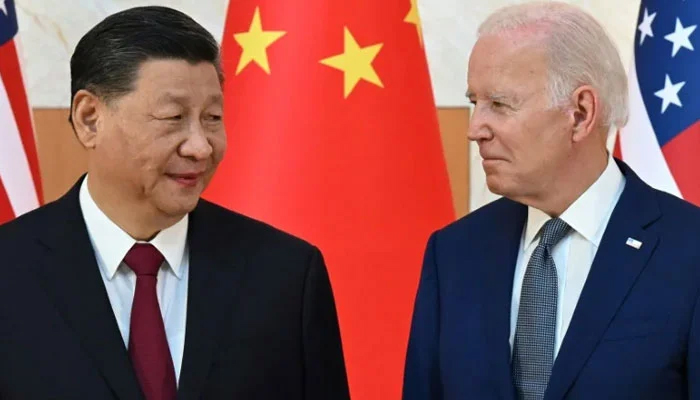In their first direct talks since November last year, President Xi Jinping told President Biden that the two major powers China and the United States should not sever ties or abandon each other, “much less should they fall into conflict or confrontation.”
At the request of U.S. President Joe Biden, Chinese President Xi Jinping had a phone call with U.S. President Joe Biden on Tuesday. Xinhua News Agency News agency reports.
The two heads of state had a candid and in-depth exchange of views on Sino-US relations and issues of common concern.
Xi Jinping also emphasized that the issue of strategic cognition has always been the foundation of Sino-US relations, just like the first button of a shirt must be buttoned correctly.
President Xi pointed out that his meeting with President Biden in San Francisco last November launched a vision for San Francisco for the future.
Over the past several months, their officers have conscientiously acted on the President’s understanding. Sino-US relations have begun to stabilize, which has been welcomed by the two countries and the international community.
On the other hand, negative factors in the relations between the two countries are also increasing, which require the attention of both sides.
The two countries should respect each other, coexist peacefully and cooperate for win-win results. Sino-US relations should continue to develop in a stable, healthy and sustainable manner rather than going backwards.
President Xi Jinping emphasized three overarching principles that will guide China-US relations in 2024.
First, peace must be valued. Both sides should establish a bottom line for non-conflict and non-confrontation in bilateral relations and continuously strengthen the positive outlook of bilateral relations.
Secondly, stability must be given top priority. Both sides should avoid retrogressing in bilateral relations, provoking troubles or crossing boundaries, and maintain the overall stability of bilateral relations.
Third, we must stick to our credibility. Both parties should take action to fulfill their commitments to each other and turn the San Francisco vision into reality. The two sides should strengthen dialogue in a respectful manner, manage differences prudently, advance cooperation in the spirit of mutual benefit and win-win, and strengthen coordination in international affairs in a responsible manner.
President Xi stressed that the Taiwan issue is the first red line that cannot be crossed in Sino-US relations. China will not sit idly by in the face of “Taiwan independence” separatist activities and the encouragement and support from the outside world.
He urged the United States to implement President Biden’s commitment not to support “Taiwan independence” into concrete actions.
The United States has taken a series of measures to suppress China’s trade and technological development, and has added more and more Chinese entities to the sanctions list.
This is not “risk removal” but creation of risk. If the United States is willing to seek mutually beneficial cooperation and share the dividends of China’s development, China’s door will always be open; President Xi said that if the United States insists on curbing China’s high-tech development and depriving China of its legitimate right to development, China will not stand idly by.
He elaborated on China’s position on Hong Kong-related, human rights, South China Sea and other issues.
President Biden said that the U.S.-China relationship is the most important relationship in the world. The progress in relations between the two countries since the San Francisco meeting shows that both sides can advance cooperation while responsibly managing differences.
President Biden reiterated that the United States is not seeking a new Cold War, its goal is not to change China’s system, its alliance is not against China, and the United States does not support “Taiwan independence” and does not seek conflict with China. China.
The United States pursues a one-China policy. China’s success is in the interest of the world.
In addition, Biden also stated that the United States has no intention to curb China’s development and does not seek “decoupling” from China.
The United States will send Treasury Secretary Yellen and Secretary of State Blinken to visit China in the near future to strengthen dialogue and communication, avoid miscalculations, promote cooperation, promote the development of bilateral relations along a stable track, and jointly respond to global challenges.
The two heads of state also exchanged views on the Ukraine crisis, the situation on the Korean Peninsula and other issues.
The two heads of state believed that the phone call was candid and constructive.
The two sides agreed to maintain communication and tasked their teams to implement the San Francisco Vision, including promoting consultation mechanisms on diplomatic, economic, financial, commercial and other issues and communication between the two militaries, conducting dialogue to strengthen cooperation in areas such as counter-drugs, artificial intelligence, and climate response, and further expanding people-to-people and cultural exchanges, Strengthen communication on international and regional issues.
China welcomes Treasury Secretary Yellen and Secretary of State Blinken’s recent visit to China.
Follow us on Google news ,Twitter , and Join Whatsapp Group of thelocalreport.in

















